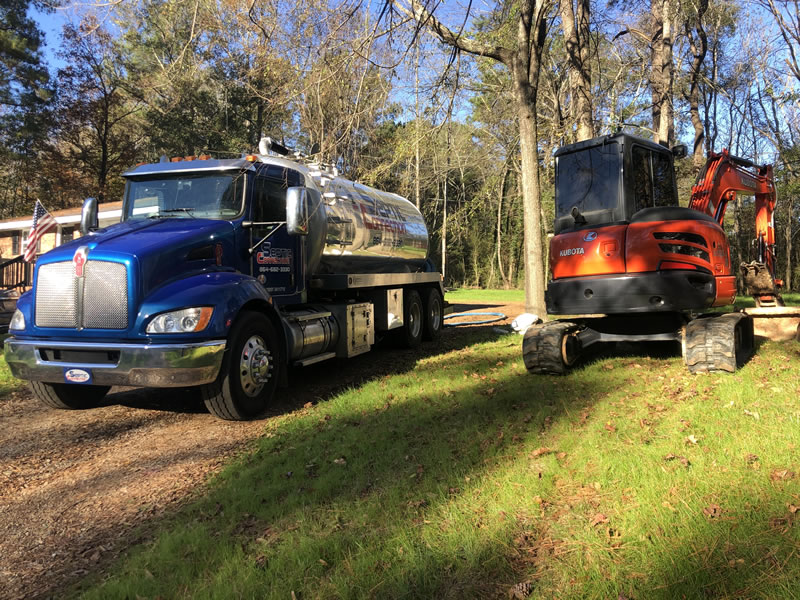Call This Wednesday to Get $25 OFF
Clean Solutions, Dirty Jobs – Done Right. Reliable. Responsive. Remarkable.
Call This Wednesday to Get $25 OFF
Clean Solutions, Dirty Jobs – Done Right. Reliable. Responsive. Remarkable.
Maintaining a healthy septic system is vital for proper functioning in your home’s wastewater disposal system. While these systems can run for years without signs of damage, one factor that can affect septic system performance is the rainy season. Besides heavy rainfall, other factors that may prompt septic tank repair include prolonged showers, draining a pool, or even leaving a garden hose on for a long time, which can cause problems. If you suspect a problem with your unit, Septic Connection is a reputable septic company ready to inspect, diagnose, and address the issue. We recommend effective ways to keep your septic system in excellent shape during the rainy season.

Routine septic tank repair and maintenance inspections are essential for a functioning and efficient system. As mentioned, septic units can withstand a lot, but become vulnerable during the rainy season. We recommend scheduling routine inspections with a trusted septic company to ensure your drain field is in tip-top shape year-long. Look out for standing water in the drain field or soggy areas around the septic tank, as these are signs of excessive moisture. If you notice any problems, contact a professional for help immediately.
Another proactive measure to prevent your septic system from becoming waterlogged is redirecting rainwater away. Ensure that gutters and downspouts direct rainwater away from the tank and drain field. During septic tank installation projects, we can recommend rainwater diversion systems or landscaping features that promote proper water runoff.
Water usage during the wet months is crucial if you want an efficient wastewater disposal system. Excessive water usage can overwhelm your septic system, making it harder to handle additional rainwater. Avoid doing multiple loads of laundry quickly or taking long showers. Spacing out your water usage can help ease the stress on your septic system during heavy rainfall.
The septic system is an onsite waste treatment facility, and it is incredibly reliable. However, the system is only as effective…
Imagine flushing your toilet and then suddenly realizing that your backyard has turned into a swampy mess. This unpleasant experience is…
Soil testing is a critical step in various construction and environmental projects. It provides essential information about the ground conditions, which…
Grease traps are remarkable tools that help keep your establishment clean and free from bad odors. Septic Connection has a…
If you have just moved into a new home or property that relies on a septic system for waste and wastewater…
Regular septic tank pumping is a crucial part of maintenance. It becomes even more vital during the rainy season. Heavy rainfall can flood your septic tank, overwhelming it and increasing susceptibility to damage. Professional septic tank pumping ensures your system can handle the additional water during the rainy season and prevent backups or slow drains.
You can incorporate a rainwater collection system during septic tank installation to harvest rainwater for non-potable uses. This eco-friendly approach helps conserve water and reduces the amount of rainwater entering your septic system. By diverting rainwater for outdoor irrigation or other purposes, you can relieve some of the stress on your septic system during rainy periods.
Regular professional maintenance is essential to keeping your septic system in optimal condition. Our experts can assess your system’s health and address any issues quickly. In addition, maintenance may involve septic tank cleaning and repair, eliminating minor issues before they get out of hand. It’s advisable to schedule a professional maintenance inspection service before the rainy season to ensure every system is in good working order.
Maintaining your septic system during the rainy season is crucial to prevent issues like slow drains, backups, or system failure. By following these tips, you can protect your septic system from the adverse effects of heavy rainfall and ensure it continues to function efficiently throughout the wet season. Contact us at Septic Connection and schedule a consultation with our experts. At competitive rates, we provide various septic services, such as septic tank cleaning, pumping, and installation.
When septic problems start, many homeowners look for quick and inexpensive solutions. Online videos, store-bought additives, and advice from well-meaning neighbors can make do-it-yourself septic fixes seem appealing. Unfortunately, septic…
Read moreA septic system is one of the most important—and most overlooked—components of a home. It manages wastewater quietly in the background, so many homeowners assume everything is fine until a…
Read more